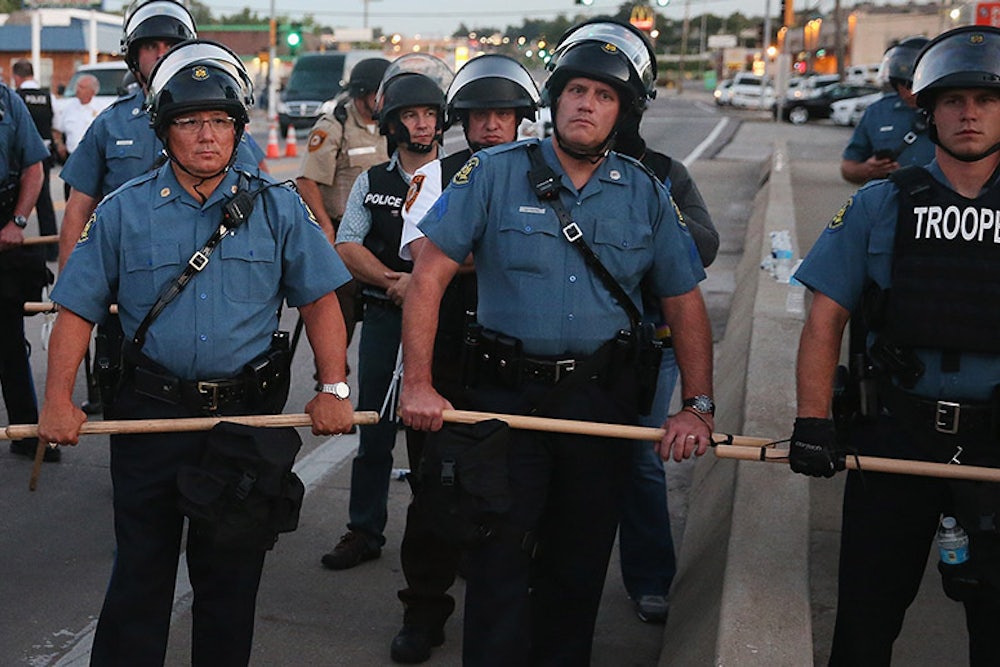About a 15-minute drive from the Ferguson protest that, by now, feels more like a block party, in the more upscale St. Louis suburb of Olivette, there’s a new strip mall with a barbecue joint and a Starbucks and an e-cigarette store. On a mild Thursday evening in August, people sat around tables, sipping coffee, sipping beer, dabbing barbecue sauce off their fingers.
All of these people were white.
It was a stark contrast to Ferguson, which is two-thirds black. Olivette is almost the exact opposite, at over 60 percent white. St. Louis, and the little hamlets that ring it, is one of the most segregated cities in America, and it shows.
Here in Olivette, the people I spoke to showed little sympathy for Michael Brown, or the protesters.
“It’s bullshit,” said one woman, who declined to give her name. When I asked her to clarify what, specifically, was bullshit, she said, “All of it. I don’t even know what they’re fighting for.”
“It’s just a lot of misplaced anger,” said one teenage boy, echoing his parents. He wasn’t sure where the anger should be, just that there should be no anger at all, and definitely no stealing.
“Our opinion,” said the talkative one in a group of six women in their sixties sitting outside the Starbucks, “is the media should just stay out of it because they’re riling themselves up even more.”
“The protesters like seeing themselves on TV,” her friend added.
“It’s just a small group of people making trouble,” said another.
“The kid wasn’t really innocent,” chimed in a woman at the other end of the table (they all declined to give their names). “He was struggling with the cop, and he’s got a rap sheet already, so he’s not that innocent.” (While the first point is in dispute, the second isn’t: The police have said that Michael Brown had no criminal record.)
If anything, the people here were disdainful and, mostly, scared—of the protesters, and, implicitly, of black people.
“I don’t think it’s about justice for Michael Brown’s family,” said the teenage boy. “It’s just an excuse for people to do whatever they want to do.”
One man I talked to, a stay-at-home dad who is a landlord to three black tenants and one white one in Ferguson (“my black tenants would never do that,” he clarified) was more sympathetic to Brown and also had the sense that the police had overdone it a bit. But he was scared of the protests. I told him that the protest that day was entirely peaceful, festive almost. “You know,” he said. “I have a wife and three children, and if something were to happen to me, that would be very bad.”
As for the protests, well, they weren’t about justice; they were just an excuse. “People are just taking the opportunity to satisfy their desire for junk,” said one woman, knowingly. As if black people, the lust for theft encoded in their DNA, are just barely kept in line by authority.
“When they kill each other, we never hear about it,” one of the Starbucks women said. This, she meant, was a good thing. “When it’s black-on-black violence, we never hear about it.”
I asked why she thought that was.
“Because, basically, they hate whites!” her friend chimed in. “Prejudice, reverse prejudice. Prejudice goes both ways.”
The others signalled their agreement.
“It’s not Ferguson people. It’s a lot of outside people coming in.”
This was a sore subject with several of the people I spoke to. A major problem with the protests—and they very clearly did not mean the militarized police response to the protests—was that they were tarnishing St. Louis’s image as a nice place.
“I’m embarrassed to say I’m from St. Louis,” the “bullshit” woman grumbled.
“Me, too,” said her friend. “I don’t tell people I’m from St. Louis anymore.”
“This is not representative of St. Louis,” said one of the older women, back at Starbucks. “St. Louis is a good place. And Ferguson is a very good place.”
“We have never had anything like this in St. Louis!” her friend exclaimed, flustered, as if trying to clear the city’s good name. “Ever!”
As the women grew uncomfortable, one of them hit on a way to fight back.
“Where are you from?” she asked me.
“Washington,” I said.
“Well,” she said, satisfied. “You people have trouble too sometimes.”
And they all laughed.
